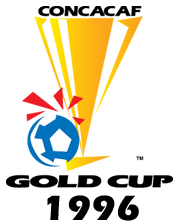| CONCACAF Championship | |
|---|---|
 1996 CONCACAF Gold Cup official logo | |
| Tournament details | |
| Host country | United States |
| Dates | January 10–21 |
| Teams | 9 (from 2 confederations) |
| Venue | 3 (in 3 host cities) |
| Final positions | |
| Champions | |
| Runners-up | |
| Third place | |
| Fourth place | |
| Tournament statistics | |
| Matches played | 13 |
| Goals scored | 42 (3.23 per match) |
| Attendance | 487,439 (37,495 per match) |
| Top scorer | |
← 1993 1998 → | |
The 1996 CONCACAF Gold Cup was the third edition of the Gold Cup, the soccer championship of North America, Central America and the Caribbean (CONCACAF).
Contents
- Venues
- Teams
- Qualification
- Squads
- Group stage
- Group A
- Group B
- Group C
- Knockout stage
- Bracket
- Semi-finals
- Third place play-off
- Final
- Statistics
- Goalscorers
- Awards
- References
- External links
The tournament returned to the United States and California; the games were hosted by Los Angeles, San Diego, and Anaheim. The format of the tournament changed from 1993: it was expanded to nine teams, separated into three groups of three and played in January as opposed to the 1993 edition which was played in July.
The top team in each group, plus the best second-place finisher would advance to the semifinals. For the first time, a non-CONCACAF team was invited: Brazil, who sent their under-23 side. Mexico won their second straight Gold Cup, beating the Brazilians 2–0 in the final.



